Educational Psychology and Pedagogical Practice in ECEC Essay
VerifiedAdded on 2023/06/06
|9
|2520
|107
Essay
AI Summary
This essay delves into the critical aspects of motivation and engagement in early childhood education (ECEC). It examines the application of contemporary educational psychology to understand and foster these crucial elements in young children. The essay explores the importance of creating a supportive learning environment and the educator's role in promoting children's motivation and engagement. Furthermore, it highlights effective teaching strategies and the significance of learner-teacher interactions. The analysis also covers the roles of the early childhood teacher, the learner, and the learning environment, including the implications for teacher practice, such as emotional, behavioral, cognitive, and voice engagement. The essay emphasizes the importance of understanding and meeting children's psychological needs to enhance their engagement and well-being, and it considers the impact of the learning environment on children's motivation. The discussion also highlights the importance of the teacher's ability to create an efficient and effective learning environment, and the use of praise and appreciation to boost children's confidence. The essay draws on the Early Years Learning Framework (EYLF) and relevant research to support its arguments.
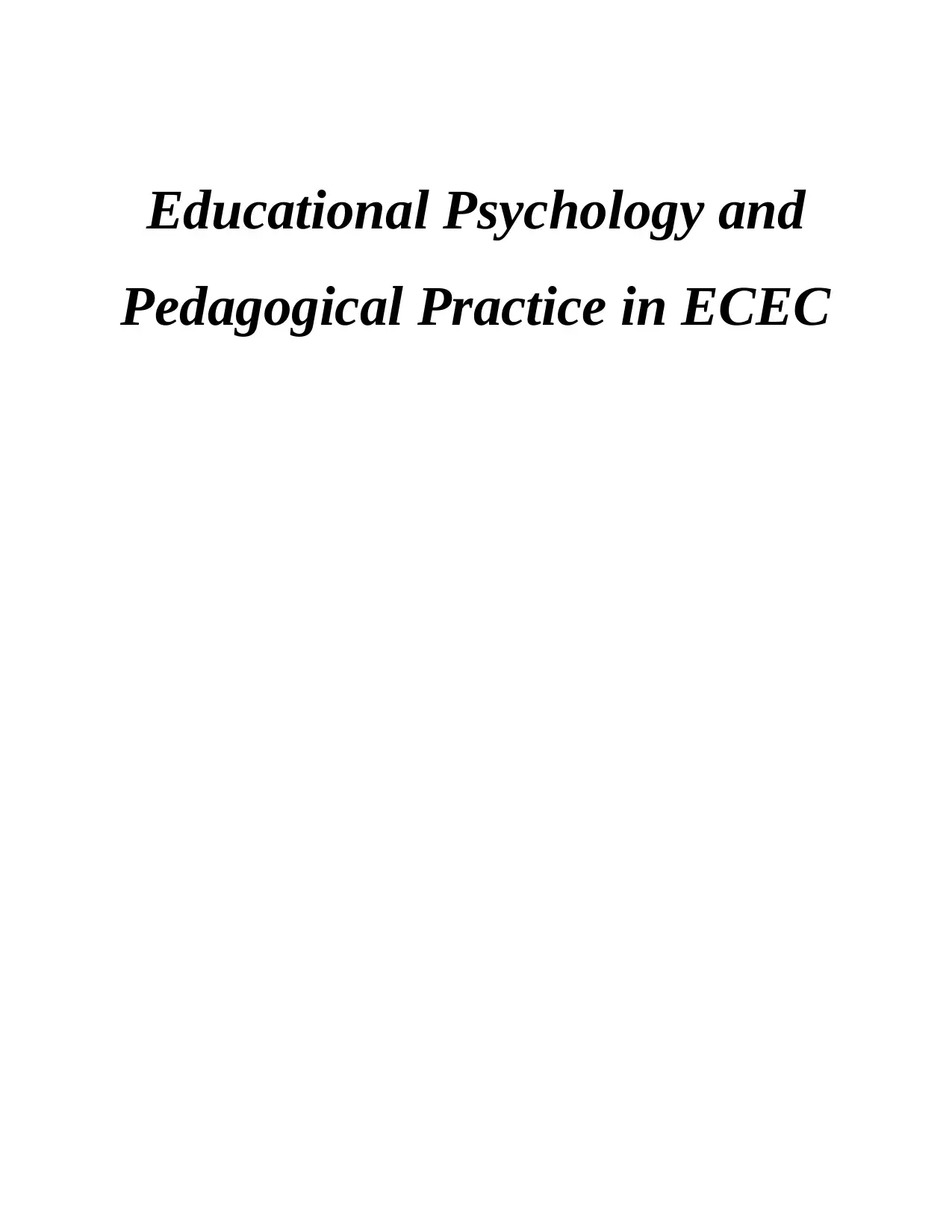
Educational Psychology and
Pedagogical Practice in ECEC
Pedagogical Practice in ECEC
Paraphrase This Document
Need a fresh take? Get an instant paraphrase of this document with our AI Paraphraser
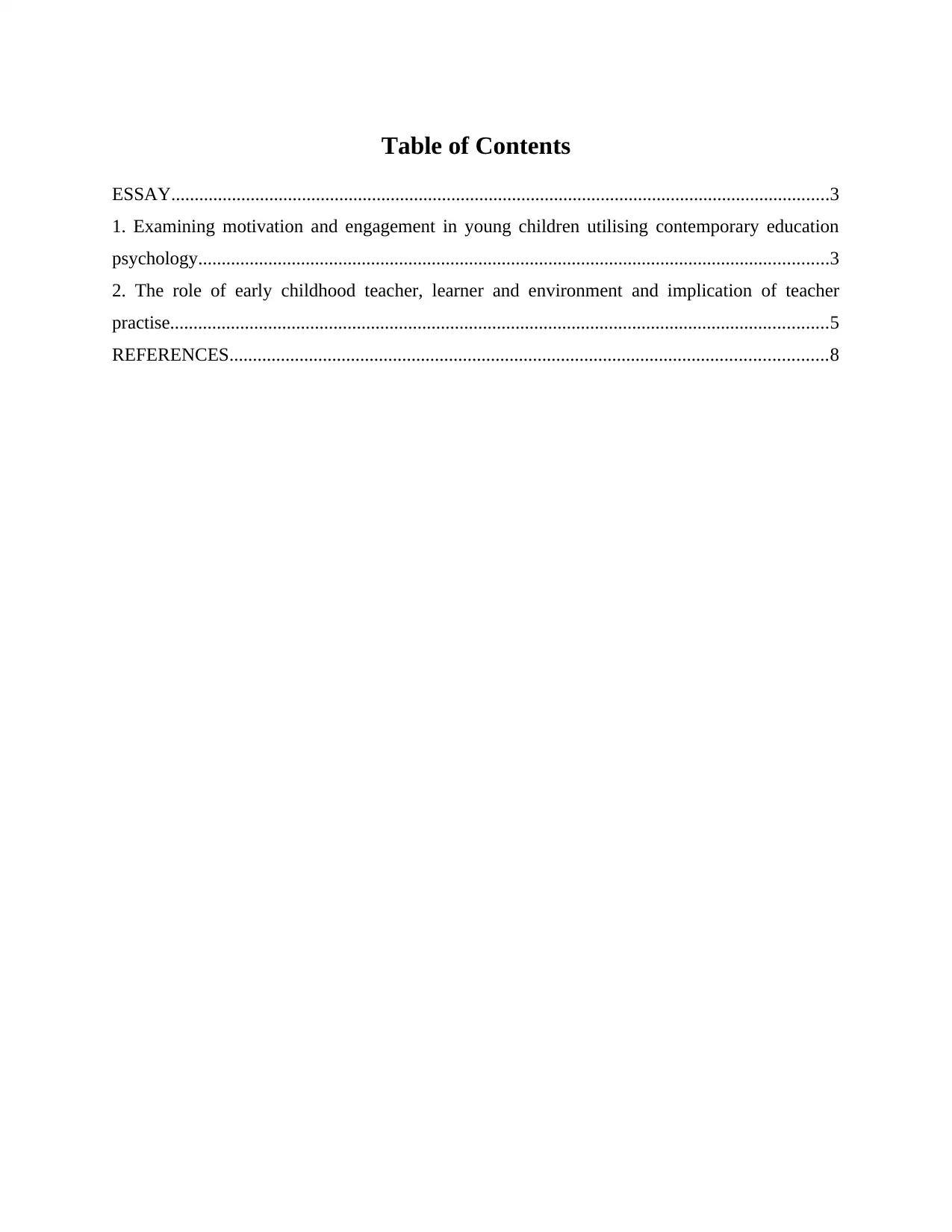
Table of Contents
ESSAY.............................................................................................................................................3
1. Examining motivation and engagement in young children utilising contemporary education
psychology.......................................................................................................................................3
2. The role of early childhood teacher, learner and environment and implication of teacher
practise.............................................................................................................................................5
REFERENCES................................................................................................................................8
ESSAY.............................................................................................................................................3
1. Examining motivation and engagement in young children utilising contemporary education
psychology.......................................................................................................................................3
2. The role of early childhood teacher, learner and environment and implication of teacher
practise.............................................................................................................................................5
REFERENCES................................................................................................................................8
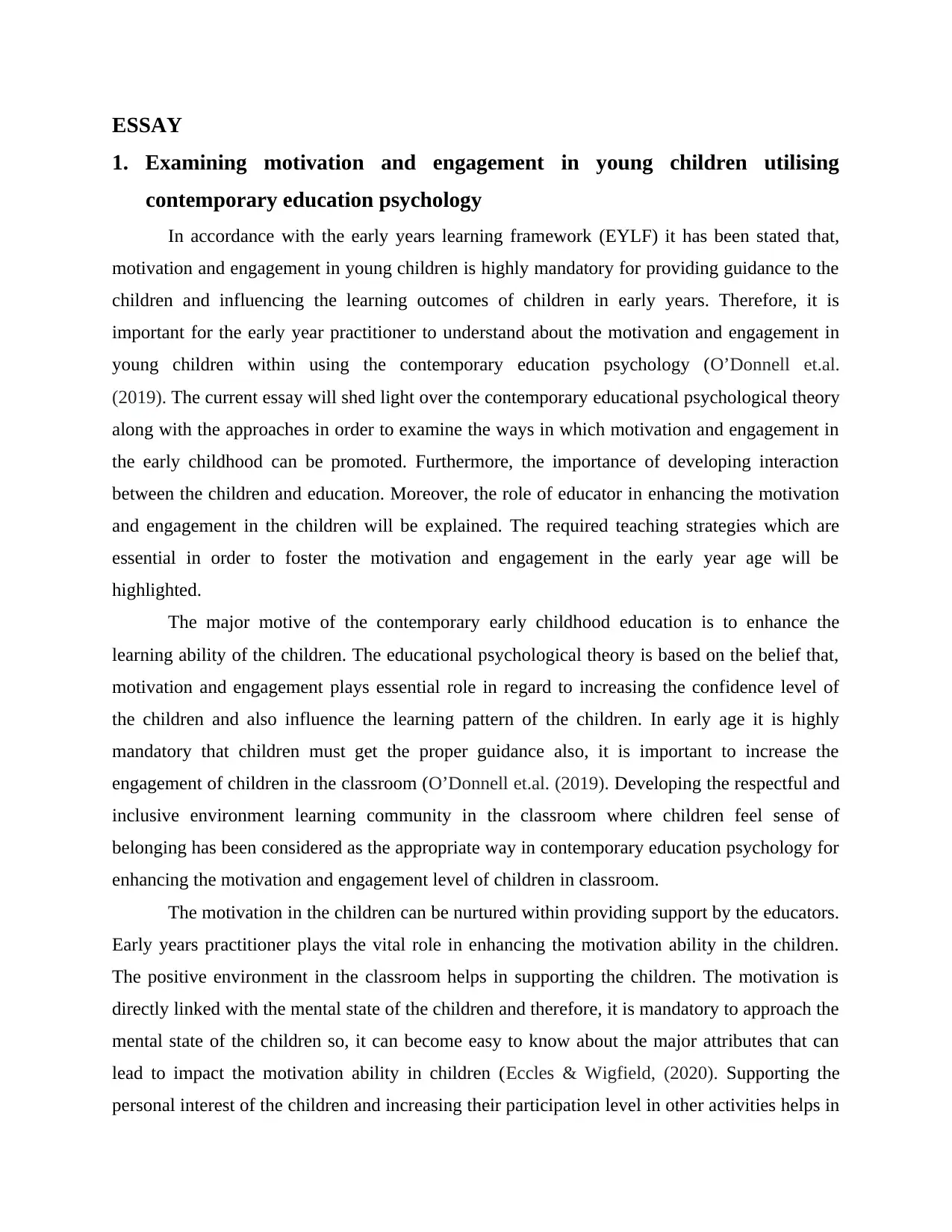
ESSAY
1. Examining motivation and engagement in young children utilising
contemporary education psychology
In accordance with the early years learning framework (EYLF) it has been stated that,
motivation and engagement in young children is highly mandatory for providing guidance to the
children and influencing the learning outcomes of children in early years. Therefore, it is
important for the early year practitioner to understand about the motivation and engagement in
young children within using the contemporary education psychology (O’Donnell et.al.
(2019). The current essay will shed light over the contemporary educational psychological theory
along with the approaches in order to examine the ways in which motivation and engagement in
the early childhood can be promoted. Furthermore, the importance of developing interaction
between the children and education. Moreover, the role of educator in enhancing the motivation
and engagement in the children will be explained. The required teaching strategies which are
essential in order to foster the motivation and engagement in the early year age will be
highlighted.
The major motive of the contemporary early childhood education is to enhance the
learning ability of the children. The educational psychological theory is based on the belief that,
motivation and engagement plays essential role in regard to increasing the confidence level of
the children and also influence the learning pattern of the children. In early age it is highly
mandatory that children must get the proper guidance also, it is important to increase the
engagement of children in the classroom (O’Donnell et.al. (2019). Developing the respectful and
inclusive environment learning community in the classroom where children feel sense of
belonging has been considered as the appropriate way in contemporary education psychology for
enhancing the motivation and engagement level of children in classroom.
The motivation in the children can be nurtured within providing support by the educators.
Early years practitioner plays the vital role in enhancing the motivation ability in the children.
The positive environment in the classroom helps in supporting the children. The motivation is
directly linked with the mental state of the children and therefore, it is mandatory to approach the
mental state of the children so, it can become easy to know about the major attributes that can
lead to impact the motivation ability in children (Eccles & Wigfield, (2020). Supporting the
personal interest of the children and increasing their participation level in other activities helps in
1. Examining motivation and engagement in young children utilising
contemporary education psychology
In accordance with the early years learning framework (EYLF) it has been stated that,
motivation and engagement in young children is highly mandatory for providing guidance to the
children and influencing the learning outcomes of children in early years. Therefore, it is
important for the early year practitioner to understand about the motivation and engagement in
young children within using the contemporary education psychology (O’Donnell et.al.
(2019). The current essay will shed light over the contemporary educational psychological theory
along with the approaches in order to examine the ways in which motivation and engagement in
the early childhood can be promoted. Furthermore, the importance of developing interaction
between the children and education. Moreover, the role of educator in enhancing the motivation
and engagement in the children will be explained. The required teaching strategies which are
essential in order to foster the motivation and engagement in the early year age will be
highlighted.
The major motive of the contemporary early childhood education is to enhance the
learning ability of the children. The educational psychological theory is based on the belief that,
motivation and engagement plays essential role in regard to increasing the confidence level of
the children and also influence the learning pattern of the children. In early age it is highly
mandatory that children must get the proper guidance also, it is important to increase the
engagement of children in the classroom (O’Donnell et.al. (2019). Developing the respectful and
inclusive environment learning community in the classroom where children feel sense of
belonging has been considered as the appropriate way in contemporary education psychology for
enhancing the motivation and engagement level of children in classroom.
The motivation in the children can be nurtured within providing support by the educators.
Early years practitioner plays the vital role in enhancing the motivation ability in the children.
The positive environment in the classroom helps in supporting the children. The motivation is
directly linked with the mental state of the children and therefore, it is mandatory to approach the
mental state of the children so, it can become easy to know about the major attributes that can
lead to impact the motivation ability in children (Eccles & Wigfield, (2020). Supporting the
personal interest of the children and increasing their participation level in other activities helps in
⊘ This is a preview!⊘
Do you want full access?
Subscribe today to unlock all pages.

Trusted by 1+ million students worldwide
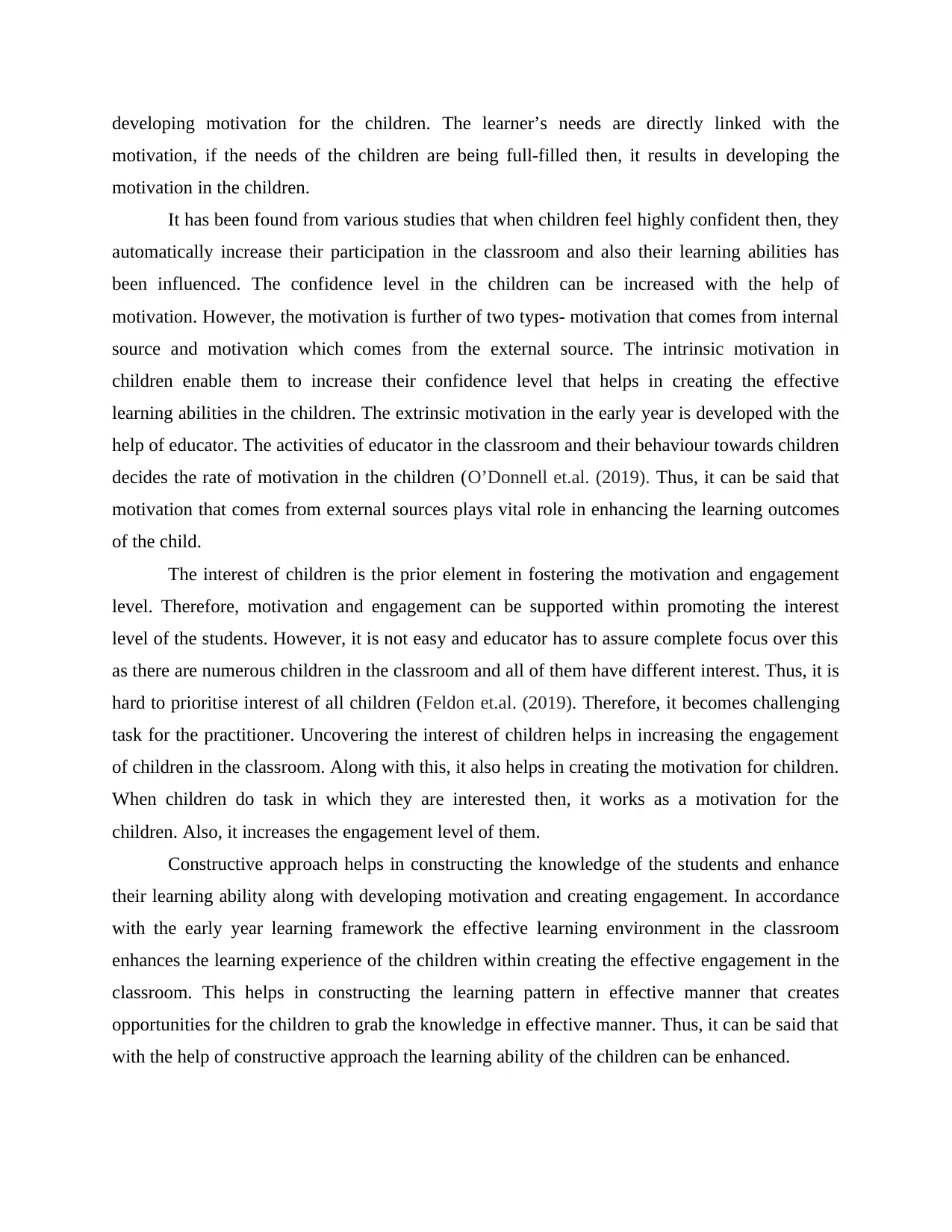
developing motivation for the children. The learner’s needs are directly linked with the
motivation, if the needs of the children are being full-filled then, it results in developing the
motivation in the children.
It has been found from various studies that when children feel highly confident then, they
automatically increase their participation in the classroom and also their learning abilities has
been influenced. The confidence level in the children can be increased with the help of
motivation. However, the motivation is further of two types- motivation that comes from internal
source and motivation which comes from the external source. The intrinsic motivation in
children enable them to increase their confidence level that helps in creating the effective
learning abilities in the children. The extrinsic motivation in the early year is developed with the
help of educator. The activities of educator in the classroom and their behaviour towards children
decides the rate of motivation in the children (O’Donnell et.al. (2019). Thus, it can be said that
motivation that comes from external sources plays vital role in enhancing the learning outcomes
of the child.
The interest of children is the prior element in fostering the motivation and engagement
level. Therefore, motivation and engagement can be supported within promoting the interest
level of the students. However, it is not easy and educator has to assure complete focus over this
as there are numerous children in the classroom and all of them have different interest. Thus, it is
hard to prioritise interest of all children (Feldon et.al. (2019). Therefore, it becomes challenging
task for the practitioner. Uncovering the interest of children helps in increasing the engagement
of children in the classroom. Along with this, it also helps in creating the motivation for children.
When children do task in which they are interested then, it works as a motivation for the
children. Also, it increases the engagement level of them.
Constructive approach helps in constructing the knowledge of the students and enhance
their learning ability along with developing motivation and creating engagement. In accordance
with the early year learning framework the effective learning environment in the classroom
enhances the learning experience of the children within creating the effective engagement in the
classroom. This helps in constructing the learning pattern in effective manner that creates
opportunities for the children to grab the knowledge in effective manner. Thus, it can be said that
with the help of constructive approach the learning ability of the children can be enhanced.
motivation, if the needs of the children are being full-filled then, it results in developing the
motivation in the children.
It has been found from various studies that when children feel highly confident then, they
automatically increase their participation in the classroom and also their learning abilities has
been influenced. The confidence level in the children can be increased with the help of
motivation. However, the motivation is further of two types- motivation that comes from internal
source and motivation which comes from the external source. The intrinsic motivation in
children enable them to increase their confidence level that helps in creating the effective
learning abilities in the children. The extrinsic motivation in the early year is developed with the
help of educator. The activities of educator in the classroom and their behaviour towards children
decides the rate of motivation in the children (O’Donnell et.al. (2019). Thus, it can be said that
motivation that comes from external sources plays vital role in enhancing the learning outcomes
of the child.
The interest of children is the prior element in fostering the motivation and engagement
level. Therefore, motivation and engagement can be supported within promoting the interest
level of the students. However, it is not easy and educator has to assure complete focus over this
as there are numerous children in the classroom and all of them have different interest. Thus, it is
hard to prioritise interest of all children (Feldon et.al. (2019). Therefore, it becomes challenging
task for the practitioner. Uncovering the interest of children helps in increasing the engagement
of children in the classroom. Along with this, it also helps in creating the motivation for children.
When children do task in which they are interested then, it works as a motivation for the
children. Also, it increases the engagement level of them.
Constructive approach helps in constructing the knowledge of the students and enhance
their learning ability along with developing motivation and creating engagement. In accordance
with the early year learning framework the effective learning environment in the classroom
enhances the learning experience of the children within creating the effective engagement in the
classroom. This helps in constructing the learning pattern in effective manner that creates
opportunities for the children to grab the knowledge in effective manner. Thus, it can be said that
with the help of constructive approach the learning ability of the children can be enhanced.
Paraphrase This Document
Need a fresh take? Get an instant paraphrase of this document with our AI Paraphraser
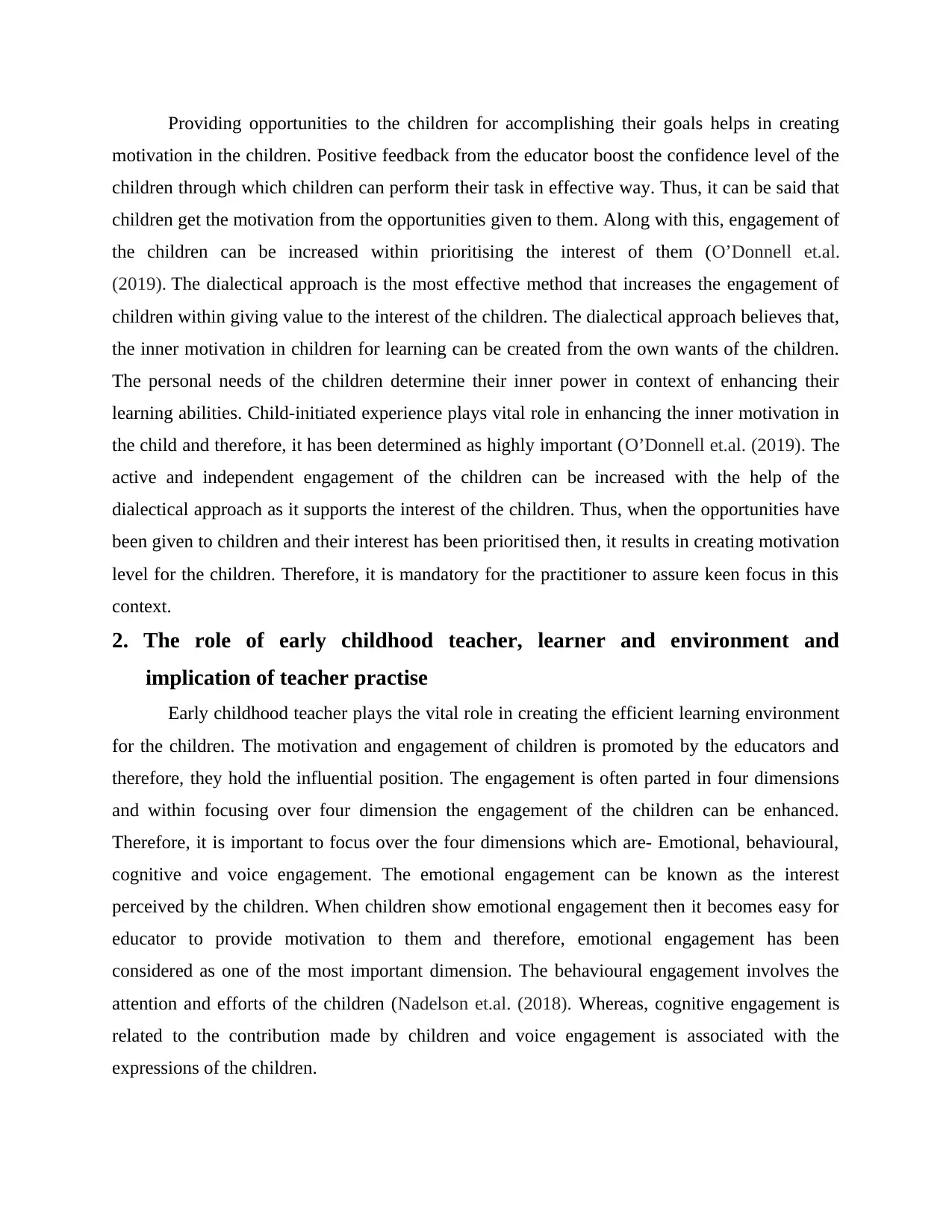
Providing opportunities to the children for accomplishing their goals helps in creating
motivation in the children. Positive feedback from the educator boost the confidence level of the
children through which children can perform their task in effective way. Thus, it can be said that
children get the motivation from the opportunities given to them. Along with this, engagement of
the children can be increased within prioritising the interest of them (O’Donnell et.al.
(2019). The dialectical approach is the most effective method that increases the engagement of
children within giving value to the interest of the children. The dialectical approach believes that,
the inner motivation in children for learning can be created from the own wants of the children.
The personal needs of the children determine their inner power in context of enhancing their
learning abilities. Child-initiated experience plays vital role in enhancing the inner motivation in
the child and therefore, it has been determined as highly important (O’Donnell et.al. (2019). The
active and independent engagement of the children can be increased with the help of the
dialectical approach as it supports the interest of the children. Thus, when the opportunities have
been given to children and their interest has been prioritised then, it results in creating motivation
level for the children. Therefore, it is mandatory for the practitioner to assure keen focus in this
context.
2. The role of early childhood teacher, learner and environment and
implication of teacher practise
Early childhood teacher plays the vital role in creating the efficient learning environment
for the children. The motivation and engagement of children is promoted by the educators and
therefore, they hold the influential position. The engagement is often parted in four dimensions
and within focusing over four dimension the engagement of the children can be enhanced.
Therefore, it is important to focus over the four dimensions which are- Emotional, behavioural,
cognitive and voice engagement. The emotional engagement can be known as the interest
perceived by the children. When children show emotional engagement then it becomes easy for
educator to provide motivation to them and therefore, emotional engagement has been
considered as one of the most important dimension. The behavioural engagement involves the
attention and efforts of the children (Nadelson et.al. (2018). Whereas, cognitive engagement is
related to the contribution made by children and voice engagement is associated with the
expressions of the children.
motivation in the children. Positive feedback from the educator boost the confidence level of the
children through which children can perform their task in effective way. Thus, it can be said that
children get the motivation from the opportunities given to them. Along with this, engagement of
the children can be increased within prioritising the interest of them (O’Donnell et.al.
(2019). The dialectical approach is the most effective method that increases the engagement of
children within giving value to the interest of the children. The dialectical approach believes that,
the inner motivation in children for learning can be created from the own wants of the children.
The personal needs of the children determine their inner power in context of enhancing their
learning abilities. Child-initiated experience plays vital role in enhancing the inner motivation in
the child and therefore, it has been determined as highly important (O’Donnell et.al. (2019). The
active and independent engagement of the children can be increased with the help of the
dialectical approach as it supports the interest of the children. Thus, when the opportunities have
been given to children and their interest has been prioritised then, it results in creating motivation
level for the children. Therefore, it is mandatory for the practitioner to assure keen focus in this
context.
2. The role of early childhood teacher, learner and environment and
implication of teacher practise
Early childhood teacher plays the vital role in creating the efficient learning environment
for the children. The motivation and engagement of children is promoted by the educators and
therefore, they hold the influential position. The engagement is often parted in four dimensions
and within focusing over four dimension the engagement of the children can be enhanced.
Therefore, it is important to focus over the four dimensions which are- Emotional, behavioural,
cognitive and voice engagement. The emotional engagement can be known as the interest
perceived by the children. When children show emotional engagement then it becomes easy for
educator to provide motivation to them and therefore, emotional engagement has been
considered as one of the most important dimension. The behavioural engagement involves the
attention and efforts of the children (Nadelson et.al. (2018). Whereas, cognitive engagement is
related to the contribution made by children and voice engagement is associated with the
expressions of the children.
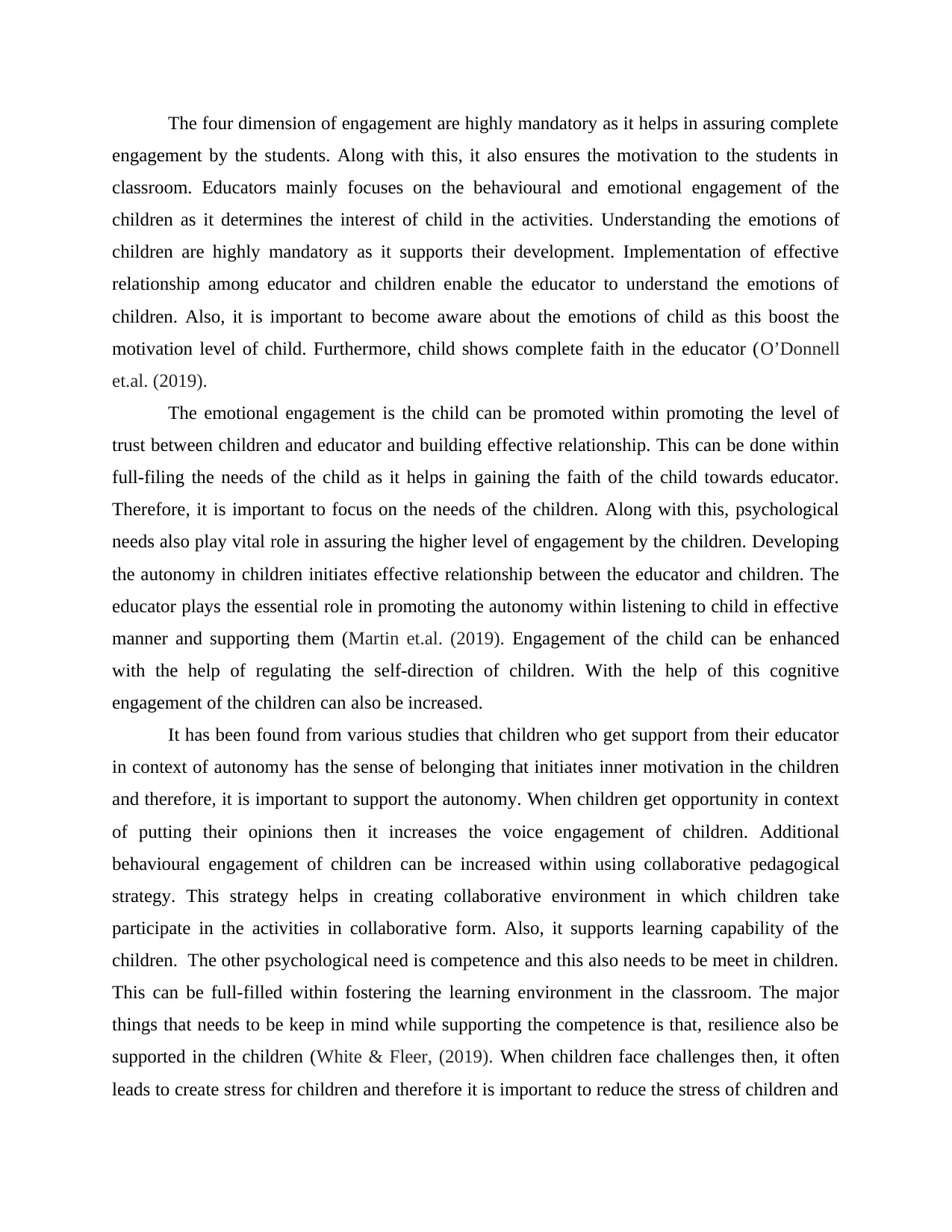
The four dimension of engagement are highly mandatory as it helps in assuring complete
engagement by the students. Along with this, it also ensures the motivation to the students in
classroom. Educators mainly focuses on the behavioural and emotional engagement of the
children as it determines the interest of child in the activities. Understanding the emotions of
children are highly mandatory as it supports their development. Implementation of effective
relationship among educator and children enable the educator to understand the emotions of
children. Also, it is important to become aware about the emotions of child as this boost the
motivation level of child. Furthermore, child shows complete faith in the educator (O’Donnell
et.al. (2019).
The emotional engagement is the child can be promoted within promoting the level of
trust between children and educator and building effective relationship. This can be done within
full-filing the needs of the child as it helps in gaining the faith of the child towards educator.
Therefore, it is important to focus on the needs of the children. Along with this, psychological
needs also play vital role in assuring the higher level of engagement by the children. Developing
the autonomy in children initiates effective relationship between the educator and children. The
educator plays the essential role in promoting the autonomy within listening to child in effective
manner and supporting them (Martin et.al. (2019). Engagement of the child can be enhanced
with the help of regulating the self-direction of children. With the help of this cognitive
engagement of the children can also be increased.
It has been found from various studies that children who get support from their educator
in context of autonomy has the sense of belonging that initiates inner motivation in the children
and therefore, it is important to support the autonomy. When children get opportunity in context
of putting their opinions then it increases the voice engagement of children. Additional
behavioural engagement of children can be increased within using collaborative pedagogical
strategy. This strategy helps in creating collaborative environment in which children take
participate in the activities in collaborative form. Also, it supports learning capability of the
children. The other psychological need is competence and this also needs to be meet in children.
This can be full-filled within fostering the learning environment in the classroom. The major
things that needs to be keep in mind while supporting the competence is that, resilience also be
supported in the children (White & Fleer, (2019). When children face challenges then, it often
leads to create stress for children and therefore it is important to reduce the stress of children and
engagement by the students. Along with this, it also ensures the motivation to the students in
classroom. Educators mainly focuses on the behavioural and emotional engagement of the
children as it determines the interest of child in the activities. Understanding the emotions of
children are highly mandatory as it supports their development. Implementation of effective
relationship among educator and children enable the educator to understand the emotions of
children. Also, it is important to become aware about the emotions of child as this boost the
motivation level of child. Furthermore, child shows complete faith in the educator (O’Donnell
et.al. (2019).
The emotional engagement is the child can be promoted within promoting the level of
trust between children and educator and building effective relationship. This can be done within
full-filing the needs of the child as it helps in gaining the faith of the child towards educator.
Therefore, it is important to focus on the needs of the children. Along with this, psychological
needs also play vital role in assuring the higher level of engagement by the children. Developing
the autonomy in children initiates effective relationship between the educator and children. The
educator plays the essential role in promoting the autonomy within listening to child in effective
manner and supporting them (Martin et.al. (2019). Engagement of the child can be enhanced
with the help of regulating the self-direction of children. With the help of this cognitive
engagement of the children can also be increased.
It has been found from various studies that children who get support from their educator
in context of autonomy has the sense of belonging that initiates inner motivation in the children
and therefore, it is important to support the autonomy. When children get opportunity in context
of putting their opinions then it increases the voice engagement of children. Additional
behavioural engagement of children can be increased within using collaborative pedagogical
strategy. This strategy helps in creating collaborative environment in which children take
participate in the activities in collaborative form. Also, it supports learning capability of the
children. The other psychological need is competence and this also needs to be meet in children.
This can be full-filled within fostering the learning environment in the classroom. The major
things that needs to be keep in mind while supporting the competence is that, resilience also be
supported in the children (White & Fleer, (2019). When children face challenges then, it often
leads to create stress for children and therefore it is important to reduce the stress of children and
⊘ This is a preview!⊘
Do you want full access?
Subscribe today to unlock all pages.

Trusted by 1+ million students worldwide
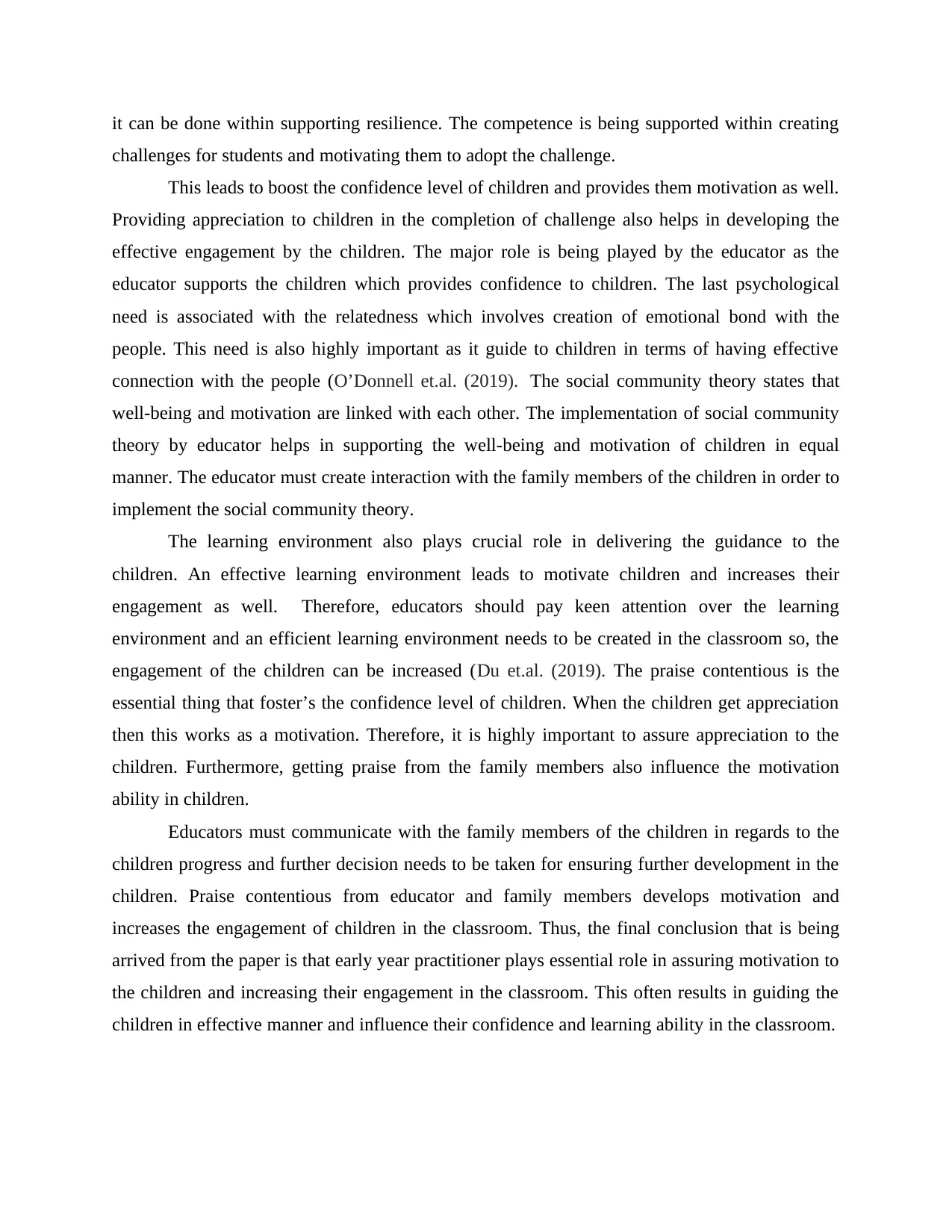
it can be done within supporting resilience. The competence is being supported within creating
challenges for students and motivating them to adopt the challenge.
This leads to boost the confidence level of children and provides them motivation as well.
Providing appreciation to children in the completion of challenge also helps in developing the
effective engagement by the children. The major role is being played by the educator as the
educator supports the children which provides confidence to children. The last psychological
need is associated with the relatedness which involves creation of emotional bond with the
people. This need is also highly important as it guide to children in terms of having effective
connection with the people (O’Donnell et.al. (2019). The social community theory states that
well-being and motivation are linked with each other. The implementation of social community
theory by educator helps in supporting the well-being and motivation of children in equal
manner. The educator must create interaction with the family members of the children in order to
implement the social community theory.
The learning environment also plays crucial role in delivering the guidance to the
children. An effective learning environment leads to motivate children and increases their
engagement as well. Therefore, educators should pay keen attention over the learning
environment and an efficient learning environment needs to be created in the classroom so, the
engagement of the children can be increased (Du et.al. (2019). The praise contentious is the
essential thing that foster’s the confidence level of children. When the children get appreciation
then this works as a motivation. Therefore, it is highly important to assure appreciation to the
children. Furthermore, getting praise from the family members also influence the motivation
ability in children.
Educators must communicate with the family members of the children in regards to the
children progress and further decision needs to be taken for ensuring further development in the
children. Praise contentious from educator and family members develops motivation and
increases the engagement of children in the classroom. Thus, the final conclusion that is being
arrived from the paper is that early year practitioner plays essential role in assuring motivation to
the children and increasing their engagement in the classroom. This often results in guiding the
children in effective manner and influence their confidence and learning ability in the classroom.
challenges for students and motivating them to adopt the challenge.
This leads to boost the confidence level of children and provides them motivation as well.
Providing appreciation to children in the completion of challenge also helps in developing the
effective engagement by the children. The major role is being played by the educator as the
educator supports the children which provides confidence to children. The last psychological
need is associated with the relatedness which involves creation of emotional bond with the
people. This need is also highly important as it guide to children in terms of having effective
connection with the people (O’Donnell et.al. (2019). The social community theory states that
well-being and motivation are linked with each other. The implementation of social community
theory by educator helps in supporting the well-being and motivation of children in equal
manner. The educator must create interaction with the family members of the children in order to
implement the social community theory.
The learning environment also plays crucial role in delivering the guidance to the
children. An effective learning environment leads to motivate children and increases their
engagement as well. Therefore, educators should pay keen attention over the learning
environment and an efficient learning environment needs to be created in the classroom so, the
engagement of the children can be increased (Du et.al. (2019). The praise contentious is the
essential thing that foster’s the confidence level of children. When the children get appreciation
then this works as a motivation. Therefore, it is highly important to assure appreciation to the
children. Furthermore, getting praise from the family members also influence the motivation
ability in children.
Educators must communicate with the family members of the children in regards to the
children progress and further decision needs to be taken for ensuring further development in the
children. Praise contentious from educator and family members develops motivation and
increases the engagement of children in the classroom. Thus, the final conclusion that is being
arrived from the paper is that early year practitioner plays essential role in assuring motivation to
the children and increasing their engagement in the classroom. This often results in guiding the
children in effective manner and influence their confidence and learning ability in the classroom.
Paraphrase This Document
Need a fresh take? Get an instant paraphrase of this document with our AI Paraphraser
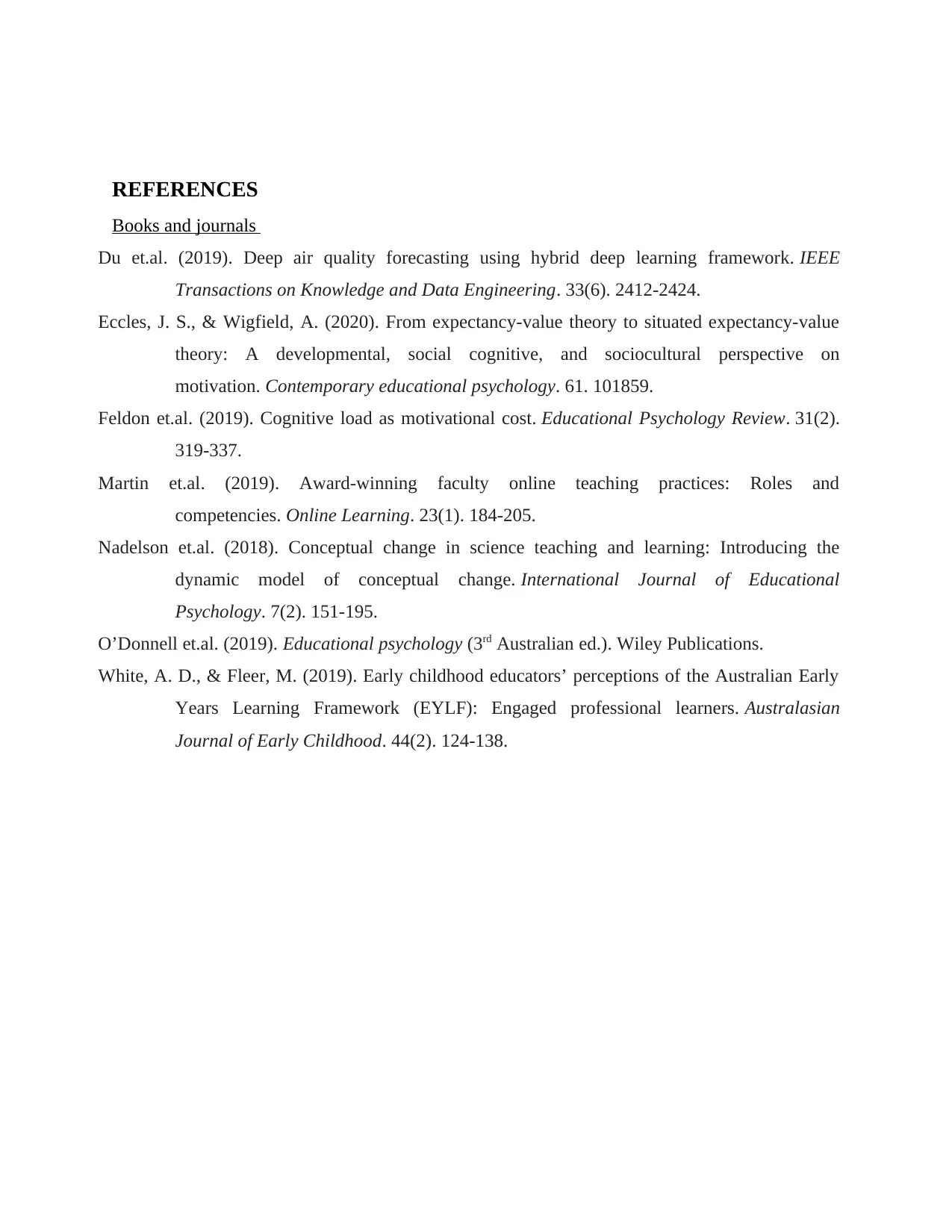
REFERENCES
Books and journals
Du et.al. (2019). Deep air quality forecasting using hybrid deep learning framework. IEEE
Transactions on Knowledge and Data Engineering. 33(6). 2412-2424.
Eccles, J. S., & Wigfield, A. (2020). From expectancy-value theory to situated expectancy-value
theory: A developmental, social cognitive, and sociocultural perspective on
motivation. Contemporary educational psychology. 61. 101859.
Feldon et.al. (2019). Cognitive load as motivational cost. Educational Psychology Review. 31(2).
319-337.
Martin et.al. (2019). Award-winning faculty online teaching practices: Roles and
competencies. Online Learning. 23(1). 184-205.
Nadelson et.al. (2018). Conceptual change in science teaching and learning: Introducing the
dynamic model of conceptual change. International Journal of Educational
Psychology. 7(2). 151-195.
O’Donnell et.al. (2019). Educational psychology (3rd Australian ed.). Wiley Publications.
White, A. D., & Fleer, M. (2019). Early childhood educators’ perceptions of the Australian Early
Years Learning Framework (EYLF): Engaged professional learners. Australasian
Journal of Early Childhood. 44(2). 124-138.
Books and journals
Du et.al. (2019). Deep air quality forecasting using hybrid deep learning framework. IEEE
Transactions on Knowledge and Data Engineering. 33(6). 2412-2424.
Eccles, J. S., & Wigfield, A. (2020). From expectancy-value theory to situated expectancy-value
theory: A developmental, social cognitive, and sociocultural perspective on
motivation. Contemporary educational psychology. 61. 101859.
Feldon et.al. (2019). Cognitive load as motivational cost. Educational Psychology Review. 31(2).
319-337.
Martin et.al. (2019). Award-winning faculty online teaching practices: Roles and
competencies. Online Learning. 23(1). 184-205.
Nadelson et.al. (2018). Conceptual change in science teaching and learning: Introducing the
dynamic model of conceptual change. International Journal of Educational
Psychology. 7(2). 151-195.
O’Donnell et.al. (2019). Educational psychology (3rd Australian ed.). Wiley Publications.
White, A. D., & Fleer, M. (2019). Early childhood educators’ perceptions of the Australian Early
Years Learning Framework (EYLF): Engaged professional learners. Australasian
Journal of Early Childhood. 44(2). 124-138.

9
⊘ This is a preview!⊘
Do you want full access?
Subscribe today to unlock all pages.

Trusted by 1+ million students worldwide
1 out of 9
Related Documents
Your All-in-One AI-Powered Toolkit for Academic Success.
+13062052269
info@desklib.com
Available 24*7 on WhatsApp / Email
![[object Object]](/_next/static/media/star-bottom.7253800d.svg)
Unlock your academic potential
Copyright © 2020–2026 A2Z Services. All Rights Reserved. Developed and managed by ZUCOL.





